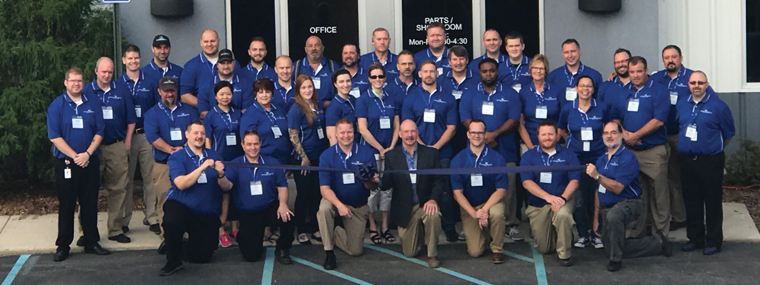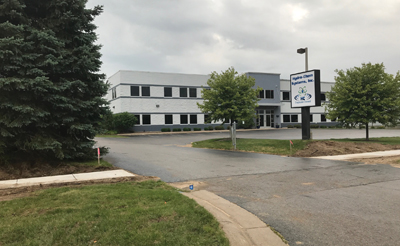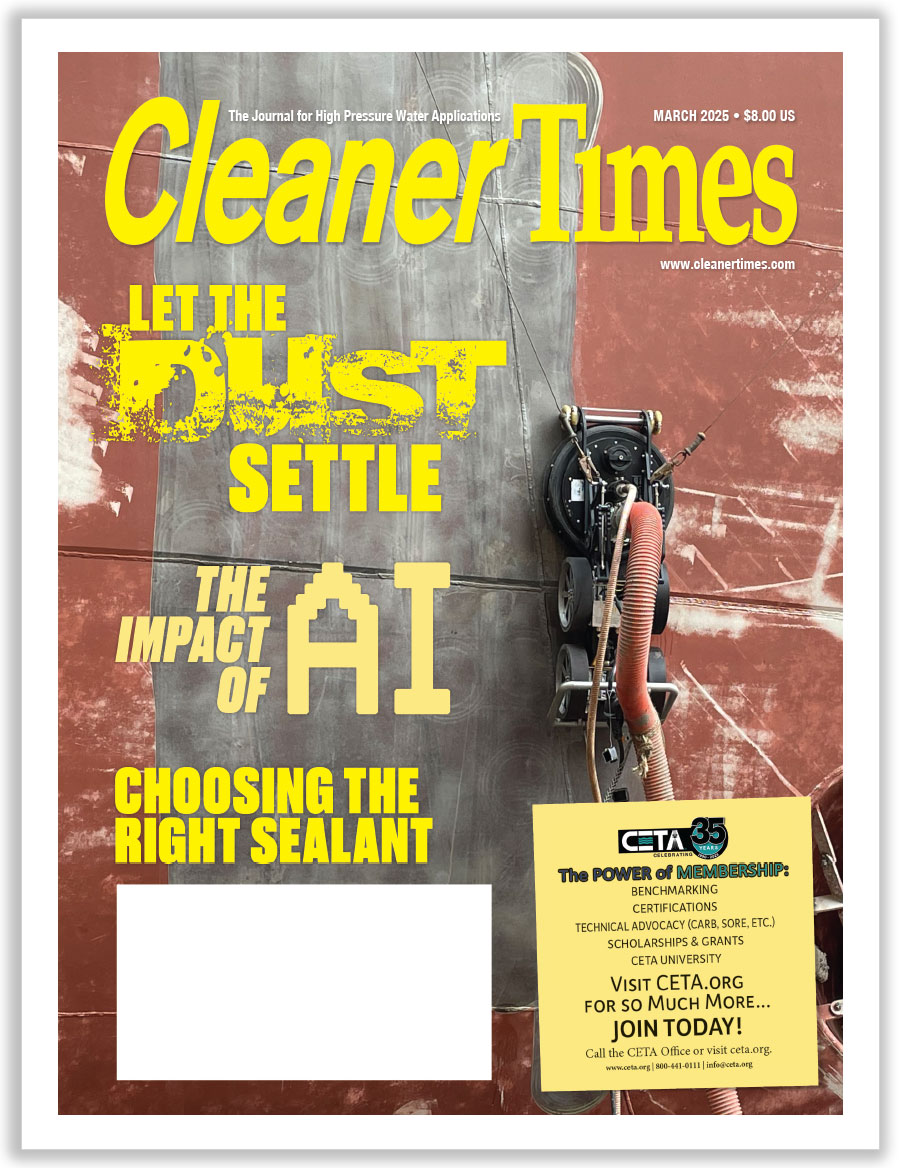
Hydro-Chem Systems
The Win/Win of Taking Ownership
By Kathy Danforth / Published May 2019

Hydro-Chem Systems, now headquartered in Caledonia, MI, has taken a winding route from its start as a mobile contract cleaner to its current status as a multi-faceted pressure washing company with more than $10,000,000 in annual sales. Founder Jim Teague started the company in 1971 working with two 2-gpm, 500-psi cold water pressure washing units. As an early pioneer with the two-step washing system, he says, “The two-step system was so efficient that we never lost a bid prospect in the first two years, even going up against guys with 10-gpm hot water units.”
Initially, Teague was a franchisee of Hydro-Sonic Systems, but he soon switched to Consolidated Chemex for better quality control and became the first distributor for Chemex. Teague relates, “We added another truck every year and eventually were running five trucks. I personally washed everything from the kitchen of the fanciest restaurants to the bottom augers in the wastewater treatment plant.”
Due to the demand, Teague began to wash trucks at the garage facilities, and eventually Teague built a truck wash around 1977. He states, “Probably the most important benefit of owning the truck wash was that every person who wanted to work in the sales department had to first work in the truck wash and learn how to properly wash trucks. Every salesperson was a professional wash person before they were allowed to go out and claim to be able to tell or show a prospect how to properly wash trucks.”
According to current vice president, Scott Harmsen, that experience gained from working in the field is a key component of Hydro-Chem’s success. “When we tell people how to clean trucks, we know since we’ve done it,” he explains. “We’re not just salespeople who have never cleaned a truck.”
By the late 1970s, Hydro-Chem was comprised of three operations: the mobile wash business, the commercial truck wash, and commercial distribution. The mobile wash and truck wash were sold, so that by the 1980s, the company was solely focused on distribution.
Harmsen notes, “Hydro-Chem began manufacturing detergents in the 1980s, so when Chemex went out of business, Teague had seen the writing on the wall and already positioned himself. At our core, we are a detergent manufacturing company—that’s our lifeblood.
“We learned in the 1980s that we wanted to sell detergent and form long-term customer relationships,” explains Harmsen. “Equipment is the method to sell the detergent, so if a customer didn’t have equipment that worked, we lost the soap business. We didn’t want equipment to be the friction point in customer relationships, so we set about building our own equipment to our own specifications. We also build our own two-step pressure washers and automated truck wash systems, and now we build commercial and trash cart cleaning trailers as well.
“We are unique in that now we manufacture equipment and detergent, and we service our own equipment,” states Harmsen. “Soap is our primary, core focus because residual sales are year to year. If you sell equipment, you have to sell a new system next year. For our business, pressure washers and automated wash systems are soap application equipment.”
 In the 1990s, change continued. “Dave Presley, our current president, was hired to design automated truck washes,” reports Harmsen. “We
In the 1990s, change continued. “Dave Presley, our current president, was hired to design automated truck washes,” reports Harmsen. “We
continue to innovate those systems, and we have more than 180 across the country and as far away as Australia. We also began building pressure
washers about the same time.”
In 2002, as Jim Teague approached retirement, he decided, “Rather than sell the business to some outsider, it would be more appropriate to reward the employees by creating an employee-owned company (or ESOP—Employee Stock Ownership Plan). The legal functions took place, and on April 1, 2002, Hydro-Chem Systems became 100 percent employee-owned.”
Harmsen joined the team about that time and states, “I feel that being employee-owned is our biggest strength. Every one of our employees is directly invested in the success of the company. We’re not just working for ‘the man,’ who gets richer; we each are working for our own retirement and future. Our customers can be assured that all our employees—from sales people to office staff from blenders to production workers—all have a personal investment in each customer’s satisfaction.”
Dan Swede, senior equipment sales specialist, points out, “There are an estimated 2,000 companies that are 100 percent employee-owned, so that is very unique.”
Taking ownership has advantages for customers and employees. Swede does point out that since each employee affects the overall success of the company, the hiring process is rigorous. “With employee ownership, you’re looking for long-term employees, so it seems like you’re going to work for NASA. We get better talent, but it takes longer. After six years, employees are fully vested in the stock program here, with profits rolling over into retirement or profit-sharing bonuses.”
The company has tripled in size over the last five years. Harmsen comments, “While I don’t want to give a biased answer, I would say our recent growth comes from fantastic products. Jim Teague instilled a relentless pursuit of excellence, so we are continually pursuing innovation and upgrading products.”
One line of products that has become extremely popular right now, according to Swede, is trash bin cleaning systems. “Our system uses a 3500-psi, 9-gpm pump and lifts two bins at one time, so we can clean bins in 7–40 seconds. Our speed has to be close to the world’s fastest. Plus, we have 15-stage wastewater recycling to handle all the debris. In trash bins, yard waste is a hard problem to deal with because of the high phosphate content that harms aquatic life. We have a proprietary oil/water separation and phosphate filtration system that takes this heavy, solid, nasty wastewater that’s loaded with phosphates, oils, grease, heavy metals, and other contaminants and cleans it to the point we can reuse it, using as little as 1/20th as much water as traditional cleaning.”
Offering quick, efficient cleaning opens doors. Swede observes, “We can clean 100 extremely filthy trash bins in 1 ½ hours, using around 300 gallons of water, where others may use 4500 gallons. Typically, a waste management company may have to pick up bins, take a half hour to clean each one, and then drop them back off,” says Swede. “It’s crazy when they can do curbside cleaning in about 2 ½ minutes per stop. We are finding companies in heavily saturated markets that want to add on this service—companies whose main service may be carpet cleaning, pest control, landscaping, property management, or pressure washing. They find that if they are at a customer’s location every month cleaning trash bins, they are likely to be hired for other services because they are familiar and already there.”
Swede notes, “We have a large division for drive-through truck washes to clean tractor-trailers. It’s like an automated car wash but for large vehicles. We have developed bio-security truck washes for the poultry industry, primarily to prevent bird flu epidemic. In the farm and grain industry, most tractor-trailers need to be sanitized inside and out to prevent the spread of viruses. For that we developed an exterior wash system where the trucks are washed and then sanitized with a spray-on post-treatment for the bio-security.”
“We are well known for our mobile fleet washing systems, with the primary focus on two-step truck washing for local contractors. To switch from low pH soap to high pH soap for rinsing, we offer remote control as well as manual control, and we manufacture all the chemicals and degreasers,” shares Swede.
“Our biggest claim to fame is our low cost per wash, whether for a trash bin, a tractor- trailer, or certain processes,” says Swede. “We can tell municipalities or fleet customers exactly what their cost per wash is and can break down the cost for water, electricity, chemicals, and soap. Some companies are paying $80–$90 per truck, but we have a system that can wash a tractor-trailer for as little as $3.50 in 90 seconds.”
Handling growth is a positive challenge, but still a challenge. Internet presence, YouTube videos, product quality, market expansion, and new marketing have led to sales opportunities, but Harmsen recalls what they learned in the 1980s: “We want to sell detergent and form long-term relationships.”
Website visits increased from 32 visitors per year in 2007 to 5500 visitors per month currently, leading to more than 250 leads per month, according to Harmsen. “We have an educational approach with customers,” he explains, “so they can’t buy online. When they call, we take the time to find out what equipment they have, the number of trucks per week and number of fleets, how many people are working, and their biggest challenges. We will tailor the product, process, and possibly equipment to them. If someone buys a pail without that education, it may not work. We have 40–50 products, and we generate a customized solution based on water hardness, heat, and pressure used. We have a guarantee: If you mix and use the product as we instruct and it doesn’t improve your cleaning, you get your money back. I don’t know that we’ve ever given money back because we take the time on the front end, and we genuinely care about our products helping the customer be more successful.”
Hydro-Chem is also trying to replicate nationwide the customer relationships they are able to maintain in their local Great Lakes region. “We don’t just want a sale for one year or two—we want to make their business successful for 20–30 years,” explains Harmsen. “It’s easy here, where you can meet face-to-face, check inventory, and find out if they need anything. We’ve decided distribution through strong distributing partners who believe as we do is the best model to follow. We find folks when we exhibit at trade events, and we are focusing on branding right now. ‘Distributing Hydro-Chem’ needs to be of value, and as part of that, we have a social media effort including hundreds of videos on YouTube.”
“Our ideal distribution partner usually falls into one of two categories,” says Harmsen. “They are a mobile washing company that has a passion to clean trucks, which is how we started. Then they can serve customers either with cleaning products or with both products and service. A pressure washer sales and service dealer is also a good fit; detergents fit in with their equipment, they may already have sales agents, and they may have servicing capability to provide if we have an automated system in the area.”
Harmsen shares, “When we put in automated systems in the Great Lakes region where we can provide face-to-face customer care, we have over 90 percent customer retention. We found that for customers farther away, after five years customer retention was much lower, so we hired a specialist to serve the automated systems across the country. We deliver local account service across the country to help maintain soap sales.”
Swede, who joined the company five years ago, appreciates the growth he has seen and feels his move from sunny Florida to snowy Michigan has been well worth it. “The company spent $750,000 on a chemical blending facility and last year moved into this 50,000 square foot facility, where we added 3000 square feet for sales,” he relates. “I’ve been in the industry more than 30 years, and I’m astonished by the cleaning solutions we’ve developed—aluminum brighteners and degreasers that work on everything from food to engine grease to petroleum. We’ll put our stuff up against anything in the country.”
“Taking ownership”—the pride, concern, effort, and responsibility involved—is not just a mentality at Hydro-Chem Systems. Because of the actual ownership in the company that each employee has, ownership is a reality that is generating sincere effort at every level. “We plan for steady growth,” says Harmsen. “We’ve been here for 47 years, and God willing, we’ll be here for 200 more, bringing value and earning business that way.”





